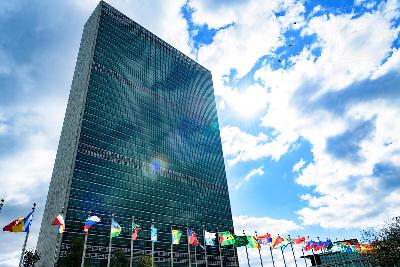"In 2021, while I was serving as Israel’s foreign minister, the U.N. General Assembly passed a series of resolutions against Israel. A year later, in 2022, when I was prime minister, the General Assembly passed yet another series of resolutions against Israel.
Nobody cared. No one burst into my office waving a piece of paper in panic. We didn’t huddle in front of the television, holding sweaty hands and waiting for the vote. Israel’s U.N. ambassador didn’t call me, choking back tears, to confess he felt like a failure. The fact that the U.N. meets and votes against Israel is like rain in London: that’s just what it does. They gather, deliver the same speech as last year, vote the same way as last year, and then head to dinner at Wolfgang’s on Park Avenue...
Israel makes up 0.1% of the world’s population, yet accounts for more than 60% of the U.N.’s condemnatory resolutions in the past decade.
In 2023, the year Hamas launched the Oct. 7 attack on Israel, the General Assembly passed 15 resolutions against Israel, and only eight against all other countries combined. This was no anomaly. Over the last decade, the General Assembly has passed 187 resolutions against Israel, and only 86 against the entire rest of the world combined. In that same decade, wars in Syria, Yemen, Ethiopia and Myanmar killed far more people than the Israeli-Palestinian conflict (yes, even including the current war in Gaza—Google the facts if you doubt it). But voting patterns at the U.N. never changed.
This isn’t just absurd — it’s an expensive absurdity. The total expenditure of the U.N. system tops $70 billion, more than the entire annual budgets of Luxembourg, Estonia, Malta and Cyprus combined. Most of that money comes from the U.S. and the European Union. And it disappears into a black hole of unaccountability. One thing is clear: it isn’t being used to advance ‘the inherent dignity and equal and inalienable rights of all members of the human family, as the foundation of freedom, justice and peace in the world,’ as the U.N. charter promises.
So, what do we need?
We need a U.N. of democracies. I suggest calling it DAWN — the Democratic Alliance for World Nations — though perhaps something less poetic would do. We don’t need to reinvent its goals. We just need to clarify the terms of membership: a commitment to democracy; a willingness to confront authoritarian leaders who make a mockery of everything we hold sacred; and a focus on fighting the great threats of our age — terrorism, religious fanaticism, fake news, nuclear weapons in the hands of reckless regimes, and the abuse of democratic mechanisms by those who despise democracy itself..."
September 10, 2025
The U.N. is a stage for hypocrisy: It’s time for democracies to exit

United Nations Headquarters (U.N. Photo)
Date
September 10, 2025
Title
The U.N. is a stage for hypocrisy: It’s time for democracies to exit, Fox News
Author(s)
Yair Lapid
